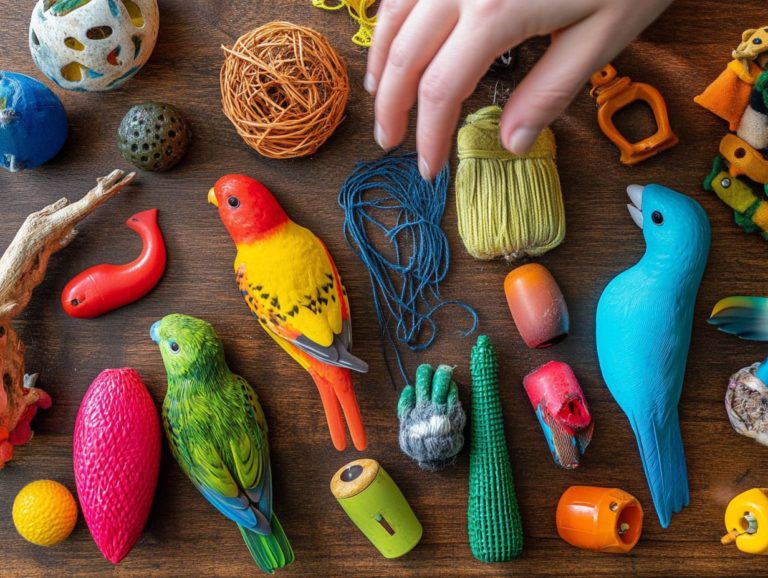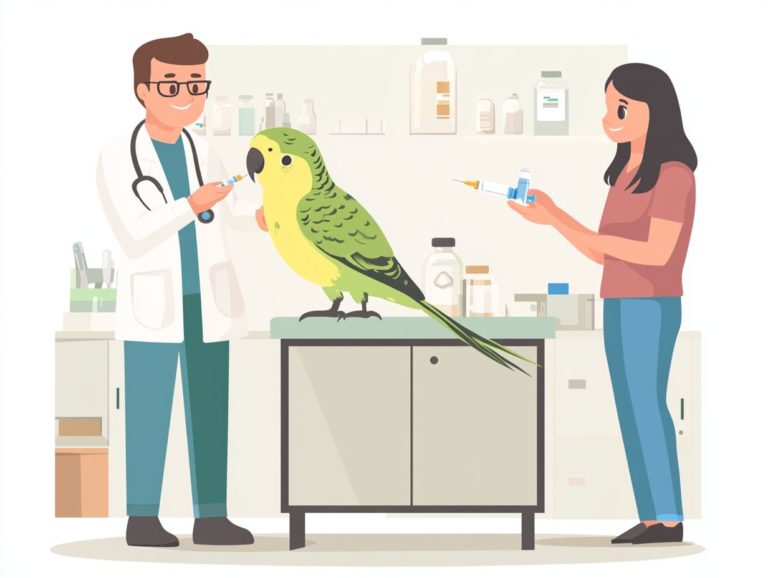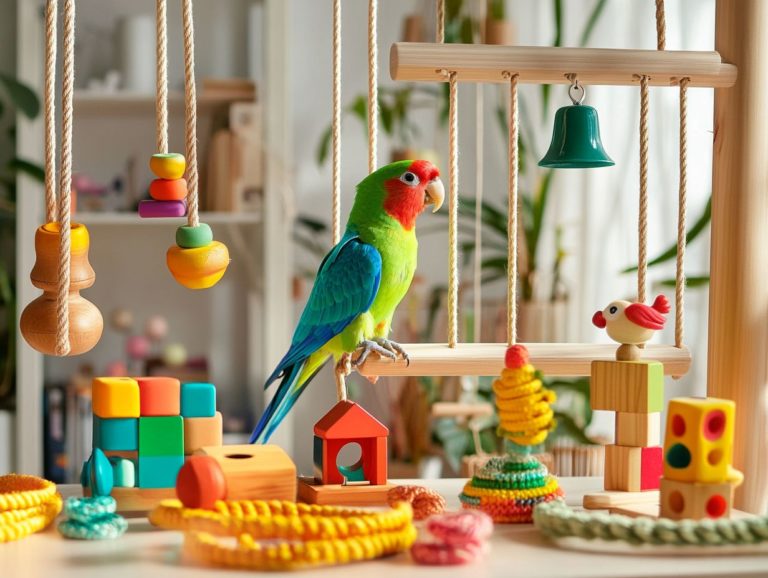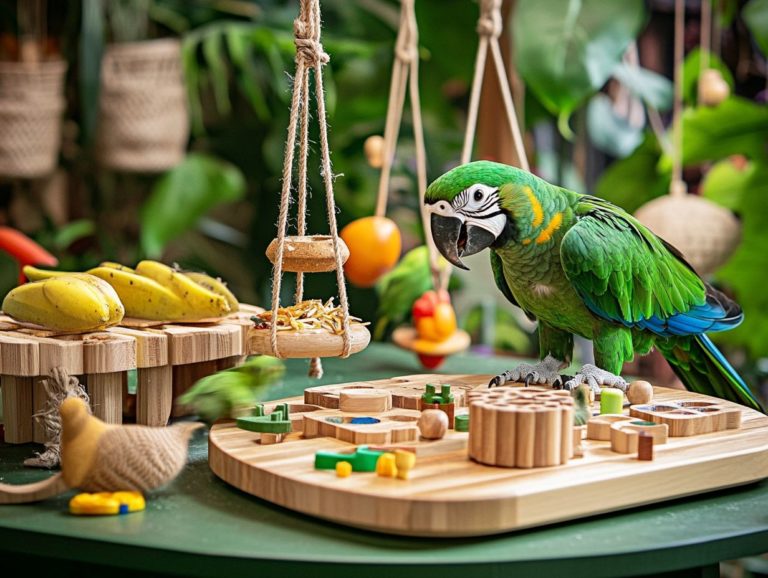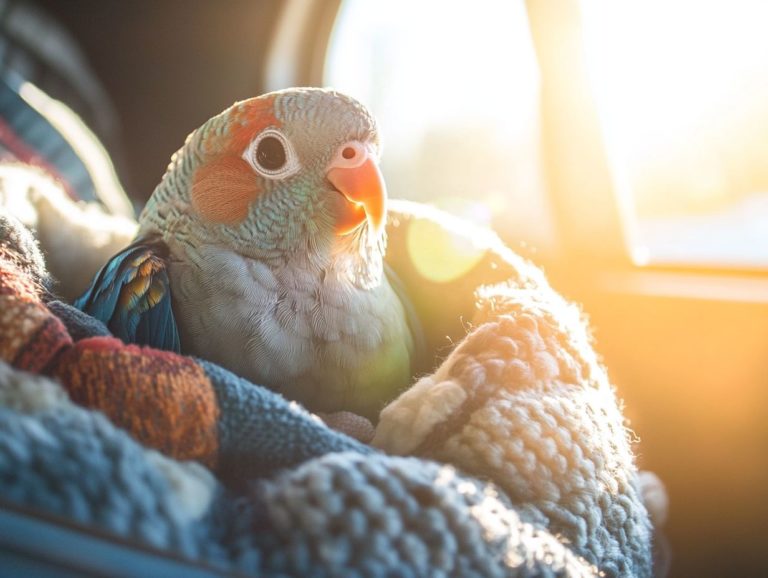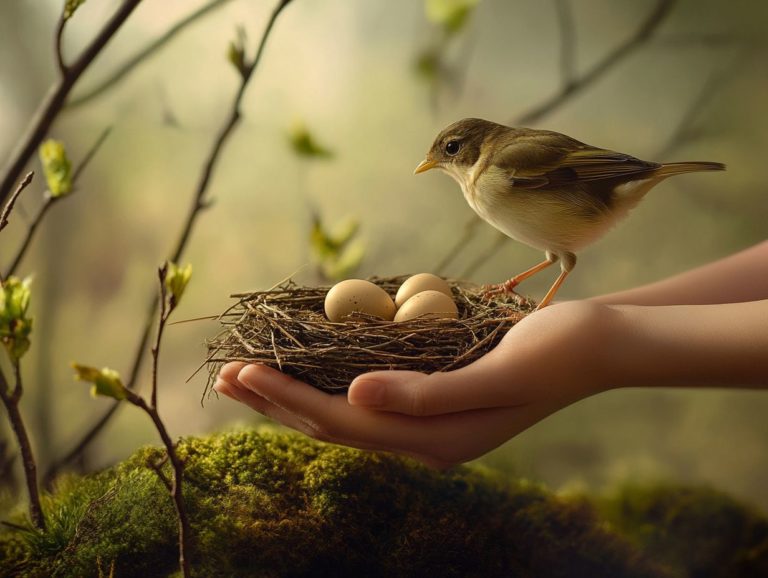What Is the Lifespan of Common Pet Birds?
When you embrace the joy of having pet birds, understanding their lifespan becomes essential as a bird owner. Curious about how long your pet bird can live? Let s dive into the lifespans of popular pet birds!
Several factors, including genetics, diet, and environment, influence how long your feathered companions will thrive. This detailed look offers invaluable tips to help you extend your bird’s life.
Join in as you discover the secrets to ensuring a healthy and happy existence for your avian friends.
Contents
Key Takeaways:
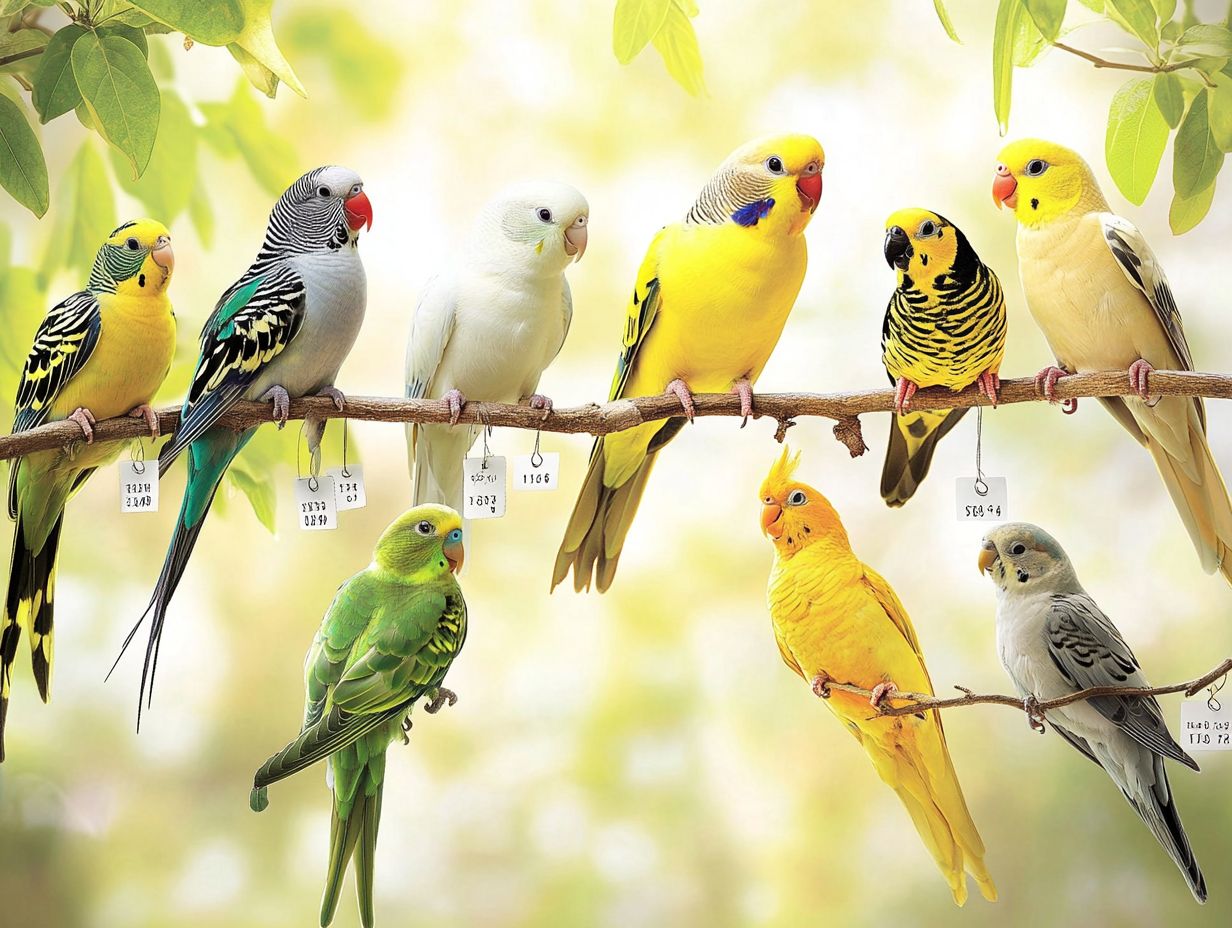
- Bird lifespan is influenced by genetics, species, diet, and environment.
- Popular pet birds like budgies, cockatiels, and parakeets generally live 5-10 years.
- Proper nutrition, regular check-ups, and a stimulating environment can help extend your bird’s lifespan.
Key Factors Influencing Bird Lifespan
Understanding the factors that influence the lifespan of pet birds is essential for ensuring they lead a healthy and fulfilling life, especially in captivity. Several elements play a role in the average lifespan of these avian companions, including genetics, species, diet, and their living environment.
This overview offers valuable insights into how proper care, regular veterinary check-ups (visits to the bird doctor), and lifestyle choices can enhance the longevity of your pet birds whether they be vibrant parrots, charming cockatoos, majestic macaws, or smaller varieties like budgerigars and canaries.
Genetics and Species
Genetics and species significantly influence the average lifespan of pet birds, particularly for popular varieties like African grey parrots, Amazon parrots, and macaws.
These avian species showcase remarkable genetic traits that play a vital role in their longevity. For instance, larger birds such as cockatoos and macaws often display complex behaviors and boast stronger immune systems compared to their smaller relatives, like budgerigars and conures.
While a cockatoo can thrive for over 70 years, a budgerigar typically enjoys a lifespan of about 5 to 10 years. Such differences underscore how genetic composition and physical size affect health and survival, shaping distinctive behaviors that influence their life expectancy.
Diet and Nutrition
A balanced diet and proper nutrition are essential for maintaining your pet bird’s health and vitality, influencing everything from feather condition to overall well-being.
Understanding the specific dietary needs of different species is critical; not all birds thrive on the same foods. Some pet birds benefit greatly from fresh fruits and vegetables, which provide essential vitamins and minerals. By incorporating a mix of commercial bird diets tailored to their specific species, you can enhance their nutrient intake.
Inadequate nutrition doesn t just hinder physical health; it can also lead to behavioral issues and a shorter lifespan. By prioritizing a well-rounded, varied diet, you can significantly contribute to your avian companion’s happiness.
Environment and Care
The environment in which you keep your pet birds plays a crucial role in their lifespan. Proper care, social interaction, and awareness of potential hazards can significantly enhance their well-being or hinder it.
To create the ideal living space, ensure they receive ample natural sunlight this is essential for their physical health and fosters a sense of normalcy. Social interaction with you and other birds is vital; these creatures thrive on companionship and engagement, helping to prevent feelings of loneliness.
Incorporating mental stimulation through toys, puzzles, and varied environments will keep their minds sharp and active. It’s equally important to minimize toxic hazards, such as certain plants and household chemicals, to ensure their safety.
Regular veterinary check-ups are necessary to monitor their health and address any potential issues early on, leading to a happier and healthier life for your feathered friends!
Start caring for your feathered friends now for a longer, happier life!
Expected Lifespan of Popular Pet Birds
When considering the expected lifespan of popular pet birds, it’s essential to recognize that different species come with distinct lifespan estimates. These are influenced by various factors, including genetics, care, and environment.
For example, common pet birds like budgerigars typically live around 5 to 10 years. In contrast, larger species such as macaws and African grey parrots can thrive for several decades when given the proper care they deserve.
Budgies
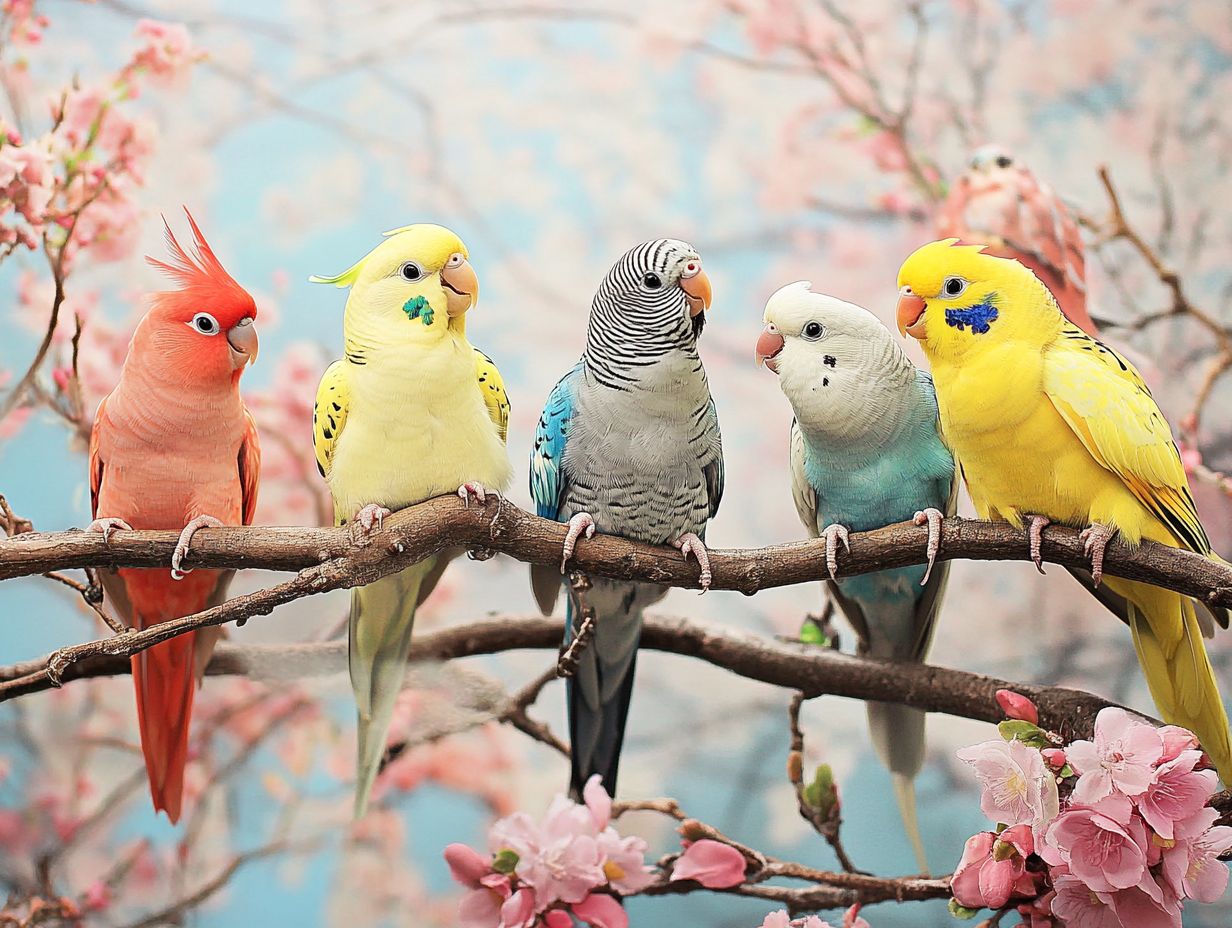
Budgerigars, or budgies as they are affectionately known, are delightful little birds renowned for their vibrant colors and friendly nature. With an average lifespan of 5 to 10 years, they ve become a favored choice among bird enthusiasts.
To ensure your budgies thrive, meeting their care requirements is crucial. A balanced diet featuring high-quality seed mixes, along with fresh fruits and vegetables, is vital for their health.
These lively birds truly thrive in the company of their own kind, so consider housing them in pairs or groups.
Creating an ideal living environment means providing spacious cages equipped with ample perches and engaging toys to stave off boredom.
Be mindful of potential health issues like feather plucking and respiratory problems. Regular veterinary check-ups and maintaining a clean habitat can alleviate these concerns. By doing so, you can help ensure a long and joyful life for your feathered companions.
Cockatiels
Cockatiels are truly delightful companions, gracing your life with their playful antics and affectionate nature. With an average lifespan of 10 to 14 years, these charming birds bring joy to your home.
To ensure your cockatiel thrives, providing ample social interaction is essential. Dedicate time each day to engage with them playtime, training sessions, or simply chatting can work wonders for their emotional well-being.
Mental stimulation is equally important; keep their curious minds engaged with toys and puzzles that challenge them.
Their food requirements are vital too; a balanced diet of high-quality seeds, pellets, fresh fruits, and vegetables promotes their health. Staying informed about common health concerns like feather plucking and respiratory issues will help ensure your feathered friend leads a happy and healthy life.
Parakeets
Parakeets, with their vibrant colors and lively personalities, typically enjoy an expected lifespan of 5 to 10 years when given proper care and social interaction.
To help these charming birds thrive, ensure they have a balanced diet rich in seeds, fresh fruits, and vegetables that meet their nutritional needs. Their cages need to be spacious, allowing plenty of room for movement, and should include multiple perches and toys to keep them entertained.
Socialization is crucial; since parakeets are naturally flock-oriented, keeping them in pairs or dedicating quality time to them can significantly enhance their well-being.
As a vigilant owner, stay alert to common health issues like feather plucking or respiratory infections. Schedule regular vet check-ups to ensure your bird stays healthy and happy!
Lovebirds
Lovebirds are delightful companions, full of affection and charm, typically living 10 to 15 years. They thrive in pairs or small groups, reflecting their inherently social nature.
To ensure these vibrant birds lead a fulfilling life, prioritize their need for companionship and social interaction. Lovebirds relish spending quality time with you or their feathered friends, engaging in playful activities that strengthen bonds and alleviate stress.
Their diet is a cornerstone of their overall health; a well-rounded blend of high-quality seeds, fresh fruits, and vegetables is essential for their well-being. Don’t forget about mental stimulation; providing toys and opportunities for exploration can help prevent boredom and encourage natural behaviors.
Canaries
Canaries are delightful songbirds, renowned for their beautiful melodies and vibrant colors. They typically grace us with their presence for an average of 10 to 15 years.
To help these charming companions thrive, you need to pay careful attention to their specific care requirements. An ideal living environment features a spacious cage that allows them to move freely and stretch their wings. Providing perches of varying sizes promotes healthy feet.
A balanced diet rich in seeds, fresh vegetables, and the occasional fruit supports their overall well-being and enhances their melodic talents. Don’t overlook regular veterinary check-ups, as they are essential for monitoring your canary’s health and preventing common ailments that could shorten their lifespan.
By providing attentive care, you can create a nurturing habitat where your canaries can truly flourish.
Finches
Finches are charming, social birds that typically enjoy a lifespan of 5 to 10 years. They thrive in the company of their fellow finches while requiring minimal handling.
These vibrant creatures display captivating social interaction behaviors, often forming strong bonds within their flocks. To ensure their happiness and well-being, provide a spacious aviary where they can fly, play, and interact.
A varied diet that includes seeds, fruits, and vegetables meets their nutritional needs. Occasional protein sources like boiled eggs can significantly enhance their health.
Ideal companions for finches are other finch species or bird-friendly pets, creating a dynamic and engaging environment. Regular cleaning and vigilant monitoring for signs of illness help maintain their lifespan and overall vitality, allowing their cheerful chirps to fill your home for many joyful years.
Parrots
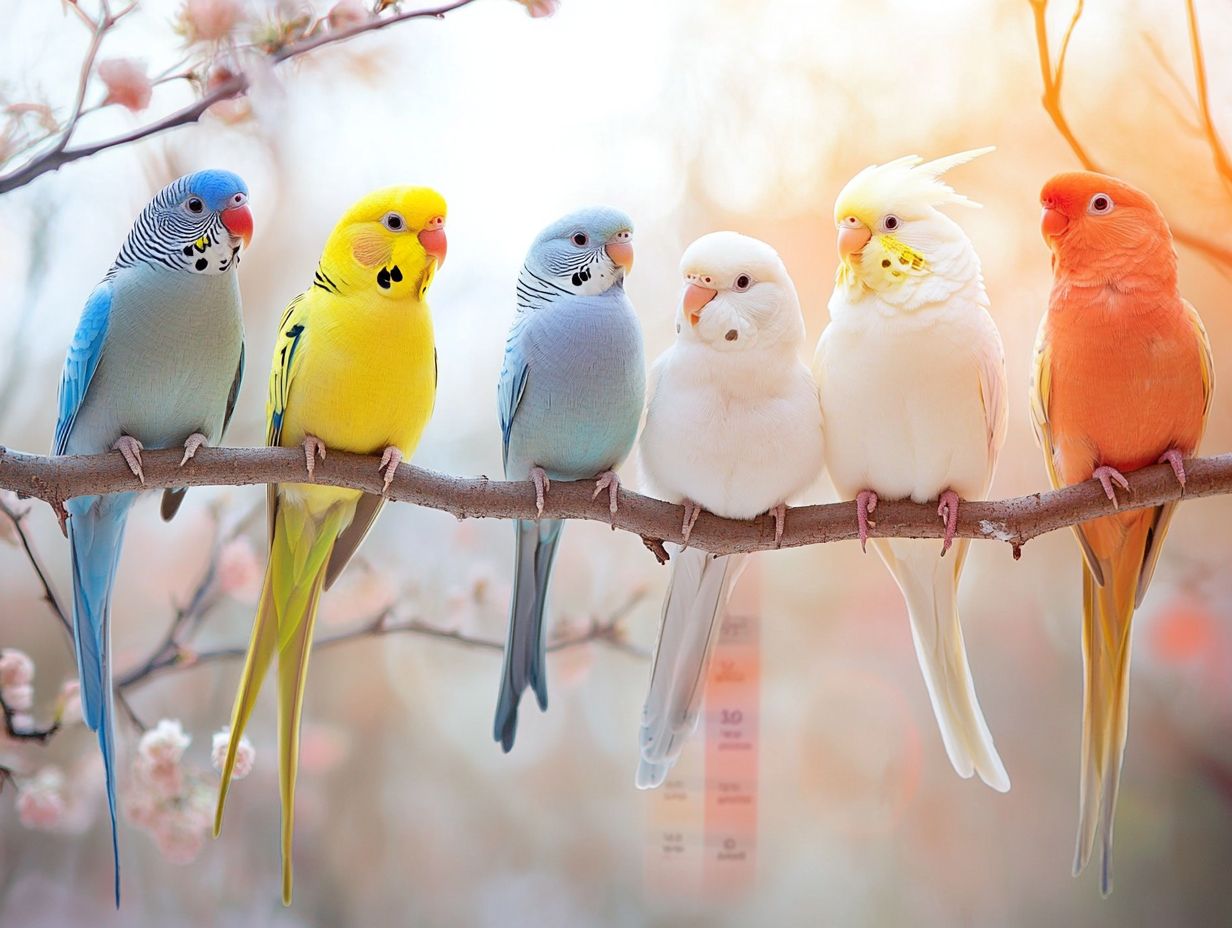
Parrots, whether charming cockatiels or majestic macaws, showcase an impressive range of lifespans. They often live anywhere from 15 to over 50 years, depending on the species.
This variation in longevity is linked to several lifestyle factors, such as the quality of care they receive, the type of social interactions, and the environments in which they flourish.
When you provide proper care with a balanced diet rich in vitamins, regular vet checkups, and plenty of mental stimulation your parrots can enjoy significantly healthier lives.
Social interaction is crucial. Parrots that regularly engage with you or other birds tend to exhibit greater resilience and happiness, which are vital for their overall well-being.
Creating a safe and enriching habitat can greatly influence their life expectancy, underscoring the importance of attentive care in maximizing the lifespan of these cherished feathered companions.
Macaws
Macaws are truly magnificent creatures, boasting a lifespan of 30 to 50 years. This places them among the longest-lived pet birds when they receive the right care.
To ensure these vibrant beings thrive, it’s essential for you to grasp their unique care requirements. A balanced diet rich in fruits, vegetables, nuts, and specially formulated pellets is crucial for their nutrition and overall health.
These birds are inherently social and thrive in engaging environments. Interacting with them whether it s you or other birds is vital for their well-being.
Mental stimulation is key. Incorporating toys, puzzles, and varied activities helps keep them happy and prevents boredom, which can lead to unwanted behavioral issues.
By adapting to their needs, you enhance their quality of life and foster a strong and rewarding bond between you and your feathered companions.
Ways to Extend Your Bird’s Lifespan
Start now with a well-rounded plan to boost your bird’s health! Consider the significance of proper nutrition, regular veterinary check-ups, and a stimulating environment designed specifically to meet their unique needs.
By focusing on these essential aspects, you can enhance your pet bird’s quality of life and longevity.
Proper Nutrition and Hydration
Providing proper nutrition and hydration is vital for the health and longevity of your pet birds. Their diets directly influence their overall well-being.
Each bird species has unique dietary requirements. While seed mixes may seem convenient, they often fall short of delivering the complete nutrition that some tropical birds need. These vibrant creatures thrive on a diet rich in fresh fruits, vegetables, and specially formulated pellets.
Without a balanced diet tailored to their specific needs, pet birds can face serious health issues. It s essential to maintain proper hydration with fresh water always available.
Incorporating a diverse range of foods ensures your feathered companions stay healthy while keeping them mentally stimulated and engaged. This leads to happier, more energetic pets.
Regular Veterinary Check-ups
Regular veterinary check-ups are essential for the health and longevity of your pet bird. These visits enable early detection and preventive measures against common health issues.
During routine appointments, the veterinarian conducts a comprehensive physical examination. They assess your bird s plumage, weight, and overall condition, looking for subtle signs of illness. It’s easy to underestimate the importance of preventive care, which helps avoid health problems.
Staying updated on vaccinations and discussing your bird’s dietary needs with a vet can greatly enhance its quality of life and lifespan, ensuring your feathered companion remains vibrant and healthy for years to come.
Providing a Stimulating Environment
Creating a stimulating environment for your pet birds is crucial for their mental health and overall well-being. It promotes social interaction and helps reduce behavioral problems.
A diverse space encourages natural behaviors like looking for food and exploring, vital for their psychological health. Introduce a variety of safe toys like chewables, swings, and puzzles to keep their minds active and engaged.
Regular interaction with you, their human caretaker, and with other birds significantly enhances their social skills and fosters a sense of community. Designating a specific play area provides opportunities for exercise and strengthens your bond, enriching their daily lives. This minimizes stress-related behaviors, ensuring a happy and healthy environment.
Frequently Asked Questions
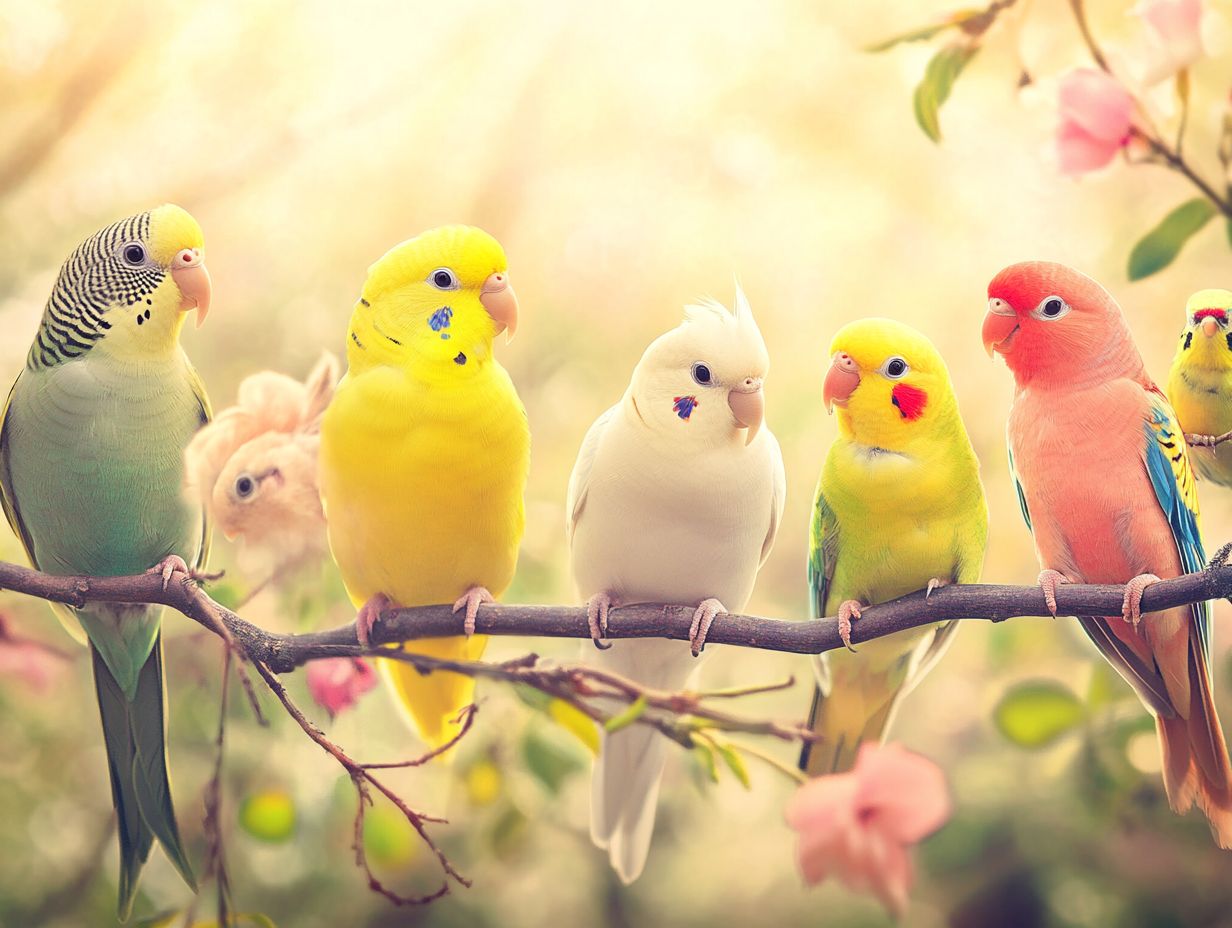
What is the lifespan of common pet birds?
The lifespan of common pet birds can vary by species, averaging anywhere from 5 to 20 years.
Which species of pet birds have the longest lifespan?
Large parrots, such as macaws and cockatoos, have the longest lifespan among common pet birds, with some living up to 80 years in captivity.
Do smaller birds have a shorter lifespan?
Yes, smaller birds like finches and budgies typically have a shorter lifespan, ranging from 5 to 10 years.
What factors can affect the lifespan of pet birds?
The lifespan of pet birds can be influenced by various factors, including diet, exercise, genetics, and overall care and environment.
Can a pet bird’s lifespan be extended?
With proper care and attention, a pet bird’s lifespan can be extended. Providing a balanced diet, regular veterinary check-ups, and mental stimulation can help increase their lifespan.
What can I do to ensure a long and healthy life for my pet bird?
To ensure a long and healthy life for your pet bird, provide a spacious and stimulating environment, a nutritious diet, regular exercise, and plenty of mental stimulation. Monitor their health and seek veterinary care if needed.

